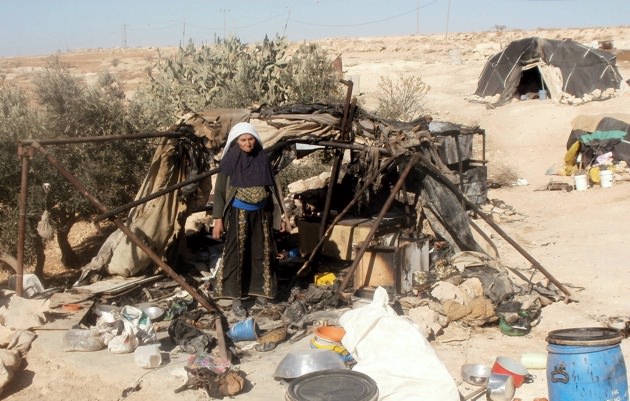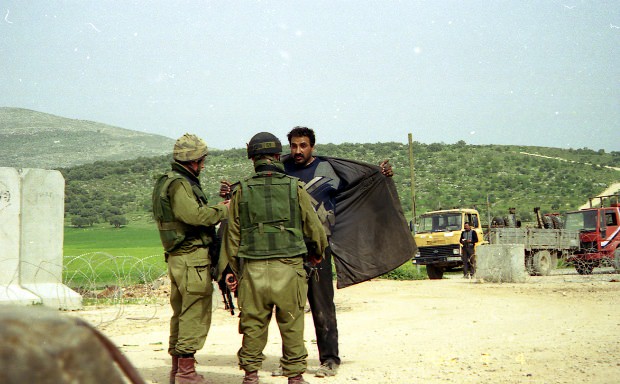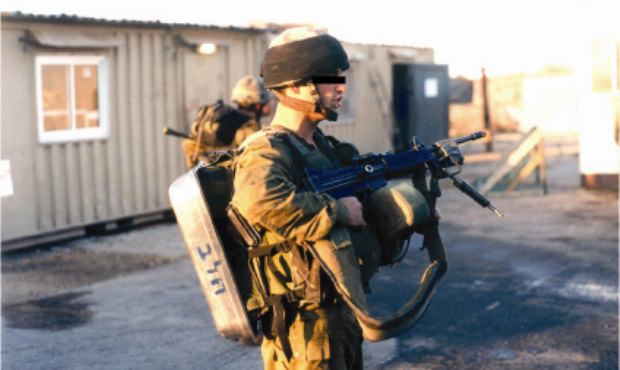The publication in Jerusalem of Occupation of the Territories: Israeli Soldiers’ Testimonies 2000-2010—unprecedented first-hand accounts by over one hundred Israeli soldiers of their experiences while serving in the IDF—coincides with an appalling yet unsurprising incident I learned of only a few days ago. On Tuesday, December 28, 2010, at 3:00 AM, Hajja Sara Nawaja, a Palestinian grandmother living in a tent with her family in the arid hills of south Hebron, on the occupied West Bank, woke to the sound of dogs barking. She smelled smoke. She discovered that two adjacent tents, which the family used as kitchens, were on fire. She woke her son Ahmad, who managed to remove the gas cylinders from the tents just in time, before they exploded. The two tents were burned to the ground. A car was seen driving away from the scene in the direction of the nearby Israeli settlement of Susya.
Did the settlers who probably set the fire intend to kill Hajja Sara and her large family? It’s quite possible. Settlers regularly harass the family, whom I know well from previous visits to the area. The previous week Hajja Sara’s brother, Hajj Khalil, was severely beaten by some fifteen settler toughs at the tiny encampment of Wadi Gheish. Will the culprits be arrested? No chance. Settlers act with virtual impunity in the wilds of south Hebron; the police and the army units in the area usually show no interest in violence directed at Palestinians. Their primary goal is to secure the settlements and the Israelis who live in them.
In fact, such events are a natural and enduring part of Israel’s military control of the West Bank, as Occupation of the Territories reveals in systematic and chilling detail. The men and women whose accounts are gathered in its 431 pages have served in the territories over the past decade and have had the courage to come forward and report on what they saw and heard and did there. The testimonies, which are anonymous, take the form of careful interviews that often focus on particular incidents in which the soldier was involved. The book is being published in Hebrew and English (the English edition, also published in Jerusalem, will be available later this month; a nearly final electronic version can be found online) by Breaking the Silence, a group of Israeli ex-soldiers with an established record of gathering first-person accounts of IDF operations.
The information was meticulously checked and re-checked for accuracy; there is no mistaking the ring of truth in the reports, which reveal consistent patterns, and thus have a powerful cumulative force. To read them is to see the profound moral corruption of the occupation in all its starkness. They show us ordinary, decent young soldiers, caught up in an impossible situation, sometimes trying desperately to make sense of that situation, but mostly following their orders without question. In a number of cases, those interviewed have clearly been psychologically and spiritually scarred by their participation in horrific events of which they had little understanding at the time.
Some of the testimonies date from the second Intifada (2000–2005). Among the worst is the report of the cold-blooded revenge killing of four (possibly more) innocent Palestinian policemen at a checkpoint near Ramallah in 2001:
All of a sudden our team commander comes … and says, “listen, this is the briefing…. we are doing … the operation is a revenge operation. We are going to eliminate six Palestinian policemen from some checkpoint in revenge for the six they took from us.” … there are like four transfer posts … those who are responsible for them are Palestinian police, and everyone from those posts they sent us … to just eliminate all the police that are there. Right? It was defined to us like, revenge, and when I even hesitated at the moment, like I asked … “What did they do? Who are they?” they said to me, “… There is a suspicion that the terrorist who killed the six went through that checkpoint.” There is a suspicion, like, but they don’t know for certain. And it could be that it’s one of those, but they said to me, “it doesn’t matter, they took six of ours, we are going to take six back.”
Were they armed?
They didn’t fire back at us. They didn’t fire back. No, they didn’t…. We gave a fire strike from afar, we didn’t hit anything..we hit one and he ran, I took him down with another bullet. Another one ran into the thing, it was, like, burning, and we chased after another…. Now, the guy who I killed, who I took down, I shot a bullet at him, he was lying on the ground, we only saw … like we only saw … something was hiding him, and we were four or three people who just put … we just kept shooting at the body.
To verify the killing?
Not to verify the killing, from the hysteria of the excitement … and then I got to him and he was, like, hacked to pieces … And I tried, and I turned him over, like … it was a 55-year-old, if not 60 year-old guy, very old, and he didn’t have a weapon.
Were they in uniform?
They were in Palestinian police uniforms. They were in Palestinian police uniforms without weapons.
But apart from atrocities like that one, what most shocks the reader of these testimonies is the routine, daily terror and humiliation inflicted on an innocent civilian population. Consider, for example, the following report, from 2005, by a soldier stationed at one of the innumerable checkpoints, in this case again in the vicinity of Ramallah:
Advertisement
The abuse at the checkpoint was severe … It was December-January, it was a difficult winter, not like this winter. It’s cold in Ramallah, and it’s unnecessary to point out that it’s an exhausting checkpoint, you stand there for 12 hours on your feet, a bullet in the chamber, it’s considered a dangerous checkpoint…. You are freezing cold and you see them coming in their warm cars. We invented a hobby: the majority of the Palestinian cars were old and the trunk doesn’t open from inside the car, we would tell them to get out and open the trunk, so they would get out into the cold and the rain. It angered me seeing them in their cars until I forgot that they don’t want to see me there.
One time a guy by the name of Amjad Jamal Nazer, I remember him well, I asked him to get out and open the trunk and he asked why, he said he could open it from the inside. There was hail, and I was a bit sick, and I told him to get out and open the trunk. He refused … he said he wasn’t getting out, I confiscated his car, I took the car keys, I told him to step to the side. He mumbled a bit, I hit him in the face with the butt of my weapon, and like that I returned to the circle of violence. My soldiers couldn’t believe it, they were so excited. I was a deputy commander at the vehicular checkpoint and this was “a step up for us,” this incident. The checkpoint became very violent.
Or another prototypical experience, this time from the northern West Bank in 2009:
We did searches in Hares, that was the straw that broke the camel’s back. They said that there are 60 houses that need to be searched. I said that surely there was some warning from intelligence, I tried to justify it to myself … It was a battalion operation, they spread out over the whole village, took control of the school, broke the locks, the classrooms. One room was the investigation room for the Shin Bet, one room for detentions, a room for the fighters to rest … We went in house by house, knocking at 2 in the morning on the door of a family. They are dying of fear, girls pee in their pants from fear. We knock hard on the doors, there is an atmosphere of “We’ll bring them down,” a fanatical atmosphere. We go into the house and turn the whole thing upside down.
What’s the procedure?
Gather the family in a particular room, put a guard, say to the guard to aim the barrel of his gun at them, and check the whole house. Another order we received, everyone born after 1980 until … an age range from 16-29, it doesn’t matter who, bring him in cuffed with plastic cuffs and a blindfold. They also yelled at old people, one of them had an epileptic seizure. They continue to yell at him more. He doesn’t speak Hebrew and they continue to yell at him. The medic treated him. We did the rounds. Every house they went into, they took everyone between 16-29 and from there brought them to the school, they sat tied up in the schoolyard.
Did they tell you the purpose of this thing?
To locate weapons. And we didn’t find any weapons in the end. They confiscated kitchen knives. What shook me the most was that there were also thefts there…. People [soldiers] went into the houses and looked for things to steal. This was a village where the people are very poor…. There was also a thing where one Palestinian (who was known to be mentally ill) yelled at the soldiers, but the soldier decided that he was going to attack him, then they simply exploded at him with blows. They hit him in the head with the butt of a weapon, he bled and they brought him to the school, to assemble with the rest.
There were a lot of arrest orders ready and signed by the battalion commander, with a blank area. They wrote that the person was detained on suspicion of disturbing the peace. So they just filled in the name and the reason for the arrest. I remember the people in plastic handcuffs, where they had put them on really close to the hands, I cut them off and put on freer ones.
Was there something else you remember from that evening?
There was a thing that they came to a house and simply demolished it…. The mom watched from the side and cried, the kids sitting with her and stroking her. I’m seeing how my mom put so much effort into every corner of our house and suddenly they come and destroy it.
What does it mean to wreck a house?
To break the floors, turn over sofas, throw plants and pictures, turn over beds, break closets, tiles…. The looks of people whose house you’ve gone into. It really hurt me to see. And after that, they left them for hours in the school tied up and blindfolded. At four in the afternoon the order came to free them. That was more than 12 hours. There were security services investigators who sat and went one by one and interrogated them.
Was there a terrorist attack earlier in the area?
No. We didn’t even find any weapons.
Particularly ominous is the far-reaching interpenetration of the army units and the Israeli settlers who, in report after report, are said to give the soldiers their orders. The editors of Occupation in the Territories describe the settlers’ special status: they are “not merely Israeli citizens entitled to protection by the Israeli army and rule of law: in practice they are also partners in the military rule of the Palestinians.” As a soldier says in one of the interviews, “You don’t want to get into a confrontation with a Jewish settlement. They are the people that are closest to you, they are like your operations branch officer, that’s how it works.”
Advertisement
Any Israeli activist can confirm this fact from his or her own experience. Countless times I have watched senior Israeli commanders in the south Hebron hills bow to the demands of local settlers by putting an end to attempts by Palestinian farmers to plow or tend to Palestinian fields, for example, or by agreeing to settlers’ demands that the army drive Palestinian shepherds and Israeli peace activists off Palestinian grazing grounds (usually by declaring such lands a Closed Military Zone—in clear contravention of an explicit ruling by the Israeli Supreme Court).
Throughout the territories, young soldiers interviewed in the book often find themselves protecting rampaging settlers and covering up their violence. For example:
I was guarding, and I see in the middle of my shift, around the afternoon, an old man with a cane coming down, an Arab from Abu Sneina, the old man looked 60 plus, with a cane, he gets to the Abu Sneina intersection, to Gross square, and all of a sudden three 16-17 year-old [settler] kids jump on him, they take him down to the floor within a second. They take a stone, open up his head. They start kicking him on the floor, opening up his head. A 60 year-old man with a stream of blood from his head…. An officer came on patrol, he didn’t know what they did, so he didn’t catch them. They just ran. And immediately the company medic came and started bandaging the old Palestinian, and we took him out in an ambulance…. It shocked me.
Afterwards I went to the officer really with my eyes tearing. A soldier for 7 months in the army, I didn’t understand what was going on here. I said to him that it can’t be like this, that we can’t protect them [the settlers], I didn’t understand how it could be. I was very shocked by that incident, it destroyed everything for me…. The soldiers don’t talk with each other about these things, there is no serious discussion in a company of combat soldiers. The male atmosphere, everything is jokes, and they treat everything with a lack of seriousness and all in all they try to get through the shit together. Because again, I told you, on the scale of unfortunate ones, you are pretty unfortunate as a soldier in Hebron. You are a sacrifice yourself.
I understood that basically everything that goes on there, [Palestinian] kids, 14 years old, 8 years old who die for no reason, innocent, where settlers go into their homes and shoot at them, and settlers go crazy in the streets and break store windows and beat up soldiers and throw eggs at soldiers and lynch the elderly, all of these things don’t even make it to the media. There is a small and isolated world in Hebron, the Avraham Avinu [settler] neighborhood sits alone in Hebron, more soldiers protect it than people live there. The people who live in that neighborhood do whatever they want, the soldiers are forced to protect them …
And it exists here in the State of Israel, and no one knows about it, and no one wants to know, and no one reports about it. People prefer not to know and not to understand that something terrible is happening not far from us, and really no one cares. And the soldiers there are unfortunate and the Palestinians are super-unfortunate. And no one helps them.
So it goes, for 431 painful pages. Most painful of all is the inescapable realization that the events reported by the soldiers—in straightforward, unpretentious, searing language—are in no sense unusual. They describe the rule and the norm, the very stuff of the occupation, now forty-three-and-a-half years old and going strong. No one involved in maintaining it gets away unscathed in heart or soul, including the ordinary soldiers who do what they’re told, although only a small number are capable of the kind of articulate reflection on their experience that we find in this book.
But it is not only the soldiers and the policemen and the judges and the bureaucrats who pay a personal price, along with their Palestinian victims. As the Israeli philosopher Yeshayahu Leibowitz predicted forty-three years ago, the occupation has brutalized Israeli society as a whole and eroded the moral foundation of our very existence. If there is still hope for Israel, it lies with those remnants of the peace camp that remain active and, in particular, with groups such as Breaking the Silence, who offer a taste of the bitter, but perhaps ultimately healing, truth.





